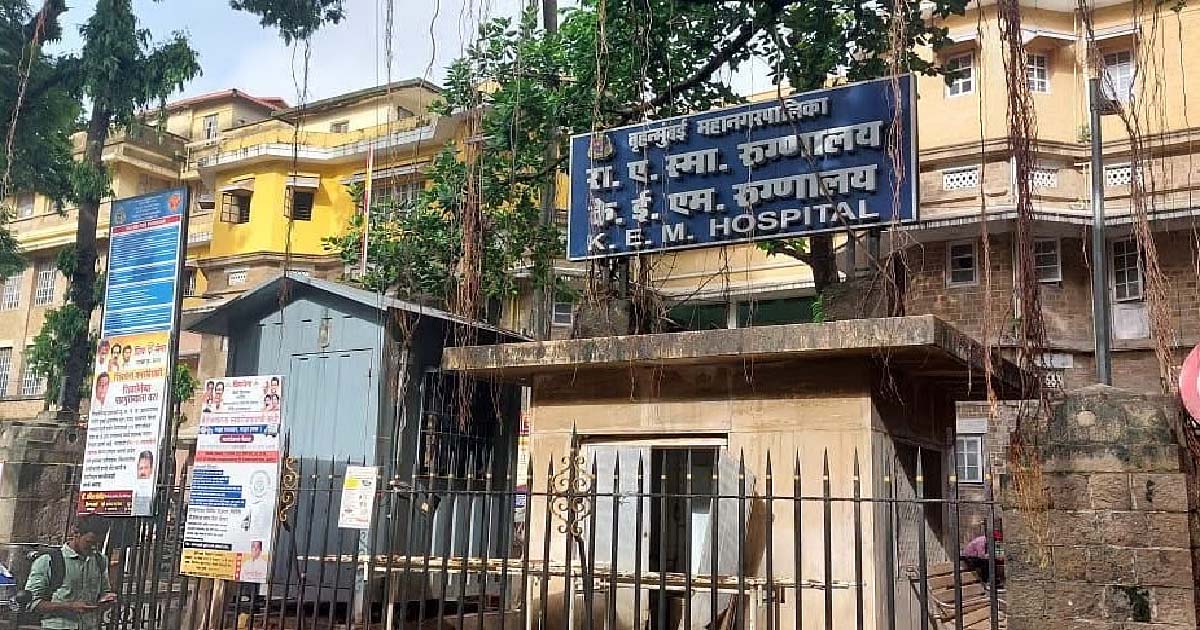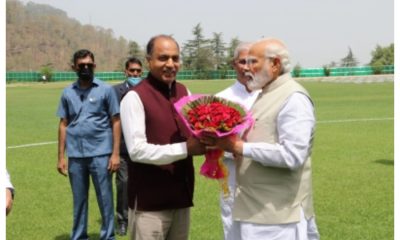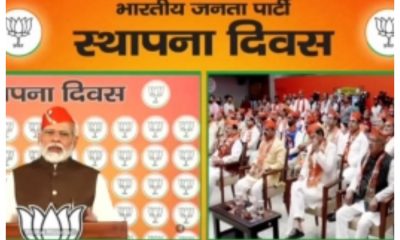National News
In Himachal too ‘rivaj badlega’, says optimist Thakur
With Himachal Pradesh heading to the Assembly polls on November 12, Chief Minister Jai Ram Thakur is leading his campaign with the slogan ‘rivaj badlega’ (electoral traditions will change) as BJP governments have repeated in the recent Uttarakhand, Uttar Pradesh and Haryana polls.
This small hill state has not seen any incumbent party returning to power since 1985. Since then both archrivals — the Congress and the BJP — ruled the state alternatively in eight terms.
This time, the saffron party, with anti-incumbency weighing heavy on its governance, seems to be banking on Prime Minister Narendra Modi’s charisma, instead of flashing its own achievement card.
The Prime Minister held three back-to-back public meetings ahead of the poll announcement.
At every rally, Thakur, the 57-year-old five-time legislator who rose through the ranks, missed no opportunity to remind the public about Modi’s special bond and love for the people of the state where he spent a few years as in-charge of the state’s affairs in the late 1990s.
“Is baar sarkaar nahin, rivaj badlega (This time not the government, but the tradition will change),” a confidant Thakur, the first-time Chief Minister who has been toeing the Modi government’s ‘Sabka Saath, Sabka Vikas’ mantra, told IANS on Saturday before heading to attend Union Minister Amit Shah’s rally in Sirmaur district, the first by the Central leadership after the poll announcement.
Firmly believing that the Prime Minister has always bestowed his blessings on Himachal by offering so many developmental projects in the past five years, Thakur asked the Opposition: What is wrong in seeking votes on the name of the ‘pradhan sevak’ who devoted his life to the welfare of the people and good governance.
“The Prime Minister has always shown his benevolence and affection to the state as he visited every nook and corner of the state as party in-charge of Himachal Pradesh. Secondly, Modi-ji as Prime Minister has visited nine times in the past five years. Even during the coronavirus pandemic he visited the state and dedicated the Atal Tunnel Rohtang.”
Taking a dig at the Congress, Thakur said on one hand it has launched ‘Bharat Jodo Yatra’, and on the other, its senior leaders are following Congress ‘Chhodo Yatra’.
“Under the dynamic leadership of Prime Minister Modi, the present government would again come into power and continue serving the people.”
Listing out achievements of the double-engine government that has given the hill state new infrastructure in every step, Thakur, who is leading the party poll campaign, said the Prime Minister’s vision and commitment to strengthen health services across the country is being showcased again in the state through the inauguration of AIIMS Bilaspur.
“This (Central) government believes in laying the foundation stone of a project and inaugurating itself.”
He thanked the Prime Minister for sanctioning the All India Institute of Medical Sciences (AIIMS) and Bulk Drug Park that will strengthen the state’s health sector and the pharmaceutical hub.
He expressed gratitude of the Prime Minister for inaugurating the IIIT (Indian Institute of Information Technology) Una, flagging off the inaugural run of the Vande Bharat Express from Amb Andaura to New Delhi and for launching the Pradhan Mantri Gram Sadak Yojana-III (PMGSY) scheme.
“More than 39,500-km road network is catering the needs of the people, especially in rural and remote areas, in the state. Out of this road length, about 50 per cent has come up under the ambitious Pradhan Mantri Gram Sadak Yojana. The sanction of Rs 3,200 crore for PMGSY-III will transform the prevailing road infrastructure and will further boost rural economic activities,” the Chief Minister explained.
Going to the polls with the firm belief that the Centre-state unison helps strengthening the spirit of cooperative and competitive federalism, Thakur, who through his stint believes development and no witch hunting, said this is only the BJP government in the Centre that realised the agony and hardships of the people of the state.
“We succeeded to excel in road, health, medical education, education and other developmental sectors, besides the welfare of the poor, downtrodden and the women.
“The previous government spent Rs 400 crore on social security pensions, whereas we are spending Rs 1,300 crore. Nearly 7.50 lakh eligible beneficiaries are presently getting pensions whereas only 4 lakh pensioners during the previous government tenure,” Thakur said, while replying to a question on the Congress promise to restore the Old Pension Scheme (OPS) to benefit 225,000 government employees, a crucial vote bank.
Thakur was elevated to the post after the party’s chief ministerial candidate Prem Kumar Dhumal suffered an abject defeat in the 2017 Assembly polls.
In the run-up to the Assembly polls, Prime Minister Modi launched Rs 6,000 crore development works across various sectors and inaugurated AIIMS Bilaspur, the foundation stone of which was laid by him on October 3, 2017.
As far as the Aam Aadmi Party (AAP) is concerned that is now setting its eyes on conquering hills after demolishing the citadels of all major political parties in Punjab, Thakur said the situation in Punjab was different.
“The people of Himachal earlier also rejected the third front. The leaders of AAP are over enthusiastic after their victory in Punjab, but they should also remember that their candidates have not only lost on all seats in the Assembly polls in Uttarakhand but their security deposits were also forfeited.”
For the Congress, corruption, unemployment and poor performance of the government are among the major poll issues.
Political observers told IANS that the BJP under the leadership of Thakur is facing anti-incumbency. This reflected in its humiliating defeat in the October 2021 by-polls in three Assembly seats and one parliamentary seat of Mandi having 17 Assembly seats in Mandi, Kullu, Lahaul-Spiti, Kinnaur and Chamba districts.
But Thakur believes it is simply a “Virbhadra wave” that did the trick for the Congress in the by-polls.
He said the Congress won because of the sympathy with the late Virbhadra Singh, which would not happen in the Assembly elections.
But to overcome the anti-incumbency, the BJP central leadership is focusing to induct seasoned politicians with organisational and ministerial experience from the Congress to give the state leadership a new look to win a consecutive term.
“For the Congress, the exodus of leaders means dampening the morale of the grassroots in the run-up to the polls,” a political observer told IANS.
He says the induction of three-time legislator Harsh Mahajan, who for over a decade played a crucial role in strengthening the party organization at the grassroots under Virbhadra Singh, in the BJP is the party’s ‘self-goal’.
Before Mahajan, two sitting Congress legislators — Lakhwinder Rana and Pawan Kajal — had also switched loyalties to the saffron party.
A total of 55.74 lakh voters would cast their votes in the elections. They comprise 27,80,203 men, 27,27,016 women, 67,532 service voters and 44,173 first-time voters. In the 2017 Assembly polls, there were 50,25,941 voters.
The counting of ballots will be held on December 8.
The BJP in the 2019 Lok Sabha elections had won all four seats that saw 72.25 per cent polling, 7.80 per cent higher than 2014 Lok Sabha polls.
In 2017, the BJP wrested power in Himachal from the Congress, winning close to a two thirds majority with 44 seats in the 68-member Assembly.
The Congress won 21 seats, independents two and the Communist Party of India-Marxist one.
National News
Mumbai: BMC-Run KEM Hospital Commissions Ultra-Modern Modular OTs For Heart Transplants And Complex Surgeries

Mumbai, Dec 26: Mumbai’s BMC-run KEM Hospital has strengthened its advanced healthcare infrastructure with the commissioning of ultra-modern steel modular operation theatres (OTs) designed for heart transplants and other complex surgeries. Following the completion of sterilisation protocols, cardiac surgeries have already commenced in the new facility.
The newly installed modular OTs feature steel walls, ceilings, frames and panels, making them resistant to dust, moisture and water. This design significantly improves cleanliness and simplifies sterilisation, thereby reducing the risk of post-operative infections.
“Equipped with laminar airflow systems and HEPA filters, the operation theatres ensure a continuous supply of clean, controlled air by filtering out bacteria, viruses, dust particles and other airborne contaminants,” said hospital officials, adding that the advanced setup will support not only heart transplants but also other organ transplants, surgeries for congenital disorders and complex paediatric procedures.
To further enhance efficiency, especially in emergency organ transplant cases, the hospital has developed special internal connectivity and separate entry points. These allow donor organs to be transported directly to the designated operation theatre, minimising time delays and reducing associated risks.
With this upgrade, KEM Hospital is expected to play a more significant role in organ transplantation and advanced surgical care in Mumbai and across Maharashtra.
Business
Keralites gulped liquor worth over Rs 332 crore during Christmas

Thiruvananthapuram, Dec 26: The Kerala State Beverages Corporation (BEVCO) recorded a sharp surge in liquor sales during the Christmas week, with revenues touching a record Rs 332.62 crore, according to official figures.
The Christmas week sales are calculated for the four days from December 22 to December 25, and officials said this year witnessed a significant jump compared to previous years.
Data shows a 19 per cent increase in sales over the corresponding period last year, underlining a strong festive demand.
The sharpest spike was recorded on Christmas Eve, when liquor sales alone amounted to Rs 114.45 crore.
In comparison, sales on the same day last year stood at Rs 98.98 crore, indicating a substantial year-on-year rise.
Officials attributed the surge not only to the festive season but also to improved consumer facilities introduced by BEVCO over the past year.
The corporation had expanded its premium retail infrastructure, including the launch of new premium counters aimed at offering a better purchasing experience and a wider selection of high-end products.
Premium outlets were recently opened in key centres such as Thrissur and Kozhikode, and officials said these had a positive impact on overall sales figures.
The enhanced facilities helped reduce crowding at regular outlets and encouraged higher-value purchases, contributing to the increase in revenue.
The Corporation has traditionally seen a spike in sales during festival periods such as Onam and Christmas, but this year’s figures mark one of the highest Christmas week turnovers recorded by the state-run corporation.
The rise in liquor sales is expected to provide a significant boost to the State exchequer, as the corporation is a major contributor to Kerala’s revenue through taxes and duties.
Liquor is sold through state-run 325 retail outlets.
Studies have shown that around 10 per cent of the 3.30 crore Kerala population are tipplers, including around three lakh women.
In 2024–25, Kerala’s liquor sales rose to Rs 19,730.66 crore, up from Rs 19,069.27 crore in 2023–24, marking an annual growth of 3.5 per cent.
Business
Govt drive returns Rs 2,000 crore unclaimed savings to rightful owners

New Delhi, Dec 26: The government has succeeded in returning to the rightful owners a total amount of nearly Rs 2,000 crore that was stuck as “unclaimed savings” across banks, insurance, mutual funds, dividends, shares, and retirement benefits held within the regulated financial system, according to an official statement issued on Friday.
The funds have been restored through the Centre’s “Your Money, Your Right” nationwide awareness and facilitation initiative, launched in October 2025 to help citizens identify and reclaim unclaimed financial assets. The initiative is being coordinated by the Finance Ministry’s Department of Financial Services, with financial sector regulators reaching across digital portals with district-level facilitation.
Across generations, Indian families have saved carefully through opening bank accounts, purchasing insurance policies, investing in mutual funds, earning dividends from shares, and setting aside money for retirement. These financial decisions are taken with a hope and responsibility, often to secure children’s education, support healthcare needs, and ensure dignity in old age.
Yet, over time, a significant portion of these hard-earned savings has remained unclaimed. The money has not vanished, nor has it been misused. It lies safely with regulated financial institutions, separated from its rightful owners due to a lack of awareness, outdated records, changes in residence, or missing documentation. In many cases, families are simply unaware that such assets exist.
The volume of unclaimed financial assets in India is significant and spans multiple segments of the formal financial system. Indicative estimates suggest that Indian banks together hold around Rs 78,000 crore in unclaimed deposits. Unclaimed insurance policy proceeds are estimated at nearly Rs 14,000 crore, while unclaimed amounts in mutual funds are about Rs 3,000 crore. In addition, unclaimed dividends account for around Rs 9,000 crore, according to official figures.
Together, these amounts underline the scale of unclaimed savings belonging to citizens that continue to remain unused, despite being securely held within the financial system.
Your Money, Your Right is a nationwide effort to reconnect citizens with these forgotten financial assets and ensure that money that belongs to individuals and families ultimately finds its way back to them.
These unclaimed financial assets arise when money held with financial institutions is not claimed by the account holder or their legal heirs for a prolonged period. Such assets include:
*Bank deposits such as savings accounts, current accounts, fixed deposits, and recurring deposits that have not been operated for ten years or more.
*Insurance policy proceeds that remain unpaid beyond the due date
*Mutual fund redemption proceeds or dividends that could not be credited due to reasons such as a change in bank account, bank account closure, incomplete bank account in records, etc.
*Dividends and shares that remain unclaimed and are transferred to statutory authorities
*Pension and retirement benefits that are not claimed within the normal course
In most cases, assets may become unclaimed because of routine life events such as migration for work, changes in contact details, closure of old bank accounts, or lack of information among family members and legal heirs.
The Government is coordinating with the Reserve Bank of India (RBI), the Insurance Regulatory and Development Authority of India (IRDAI), the Securities and Exchange Board of India (SEBI), the Investor Education and Protection Fund Authority (IEPFA), and the Pension Fund Regulatory and Development Authority (PFRDA) to help citizens identify, access and reclaim financial assets that legally belong to them, using simple processes and transparent systems.
-

 Crime3 years ago
Crime3 years agoClass 10 student jumps to death in Jaipur
-

 Maharashtra1 year ago
Maharashtra1 year agoMumbai Local Train Update: Central Railway’s New Timetable Comes Into Effect; Check Full List Of Revised Timings & Stations
-

 Maharashtra1 year ago
Maharashtra1 year agoMumbai To Go Toll-Free Tonight! Maharashtra Govt Announces Complete Toll Waiver For Light Motor Vehicles At All 5 Entry Points Of City
-

 Maharashtra1 year ago
Maharashtra1 year agoFalse photo of Imtiaz Jaleel’s rally, exposing the fooling conspiracy
-

 National News1 year ago
National News1 year agoMinistry of Railways rolls out Special Drive 4.0 with focus on digitisation, cleanliness, inclusiveness and grievance redressal
-

 Maharashtra1 year ago
Maharashtra1 year agoMaharashtra Elections 2024: Mumbai Metro & BEST Services Extended Till Midnight On Voting Day
-

 National News1 year ago
National News1 year agoJ&K: 4 Jawans Killed, 28 Injured After Bus Carrying BSF Personnel For Poll Duty Falls Into Gorge In Budgam; Terrifying Visuals Surface
-

 Crime1 year ago
Crime1 year agoBaba Siddique Murder: Mumbai Police Unable To Get Lawrence Bishnoi Custody Due To Home Ministry Order, Says Report


















